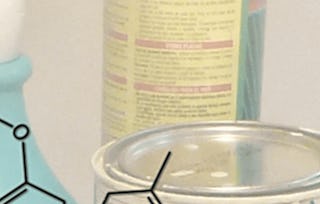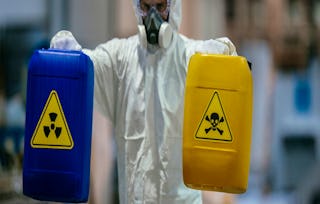This course covers chemicals in our environment and in our bodies and how they impact our health. It addresses policies and practices related to chemicals, particularly related to how they get into our bodies (exposures), what they do when they get there (toxicology), how we measure them (biomonitoring) and their impact on our health. Most examples are drawn from the US.

Chemicals and Health
Ends soon: Gain next-level skills with Coursera Plus for $199 (regularly $399). Save now.

(1,442 reviews)
Skills you'll gain
Details to know

Add to your LinkedIn profile
See how employees at top companies are mastering in-demand skills

There are 6 modules in this course
Start off this week with the peer assessment (we know, we know. . .how can we have an assessment before the course even starts, right?). We simply hope to gauge your initial understanding of the topics that we’ll cover (so grade easy). Then we get into a quick overview of the course, a discussion of chemicals & how we are exposed (in three parts) and an introduction to chemical production & regulation. The module ends with a fun homework assignment: watch an eight-minute video and discuss amongst yourselves (and with us too).
What's included
5 videos2 readings1 peer review1 discussion prompt
Now that you have a sense of what a chemical is, and how we are exposed to them, we dive into the science of how chemicals impact our health, starting with toxicology. But before you dive into the study of poisons, please review, evaluate, and grade at least four of your classmates' submissions from last week. After you listen to the lectures by Professor Trush, take the ten-question/multiple-choice quiz that covers weeks 1 & 2. Feel free to go back and use the lectures to help you answer the questions.
What's included
3 videos1 assignment
Start by watching a two-minute video and a five-minute news report. Post your reactions not only to the video and audio files, but also to your peers’ thoughts! Next you’ll hear from a CDC scientist about the US’ National Biomonitoring Program, then you’ll hear how that program translates to the local level. Be sure to keep in mind the relationship of communities to their government! This week is pretty light – so enjoy!
What's included
2 videos1 discussion prompt
Finally we get to one of the main questions presented in this course - how do scientists assess the impact of chemicals on our health? You’ll hear from a physician who specializes in environmental & occupational medicine and epidemiology. Then you’ll hear how policymakers use the knowledge that we do have (about chemicals & health) to assess risk and drive policy. Once you’ve viewed the two lectures, another ten-question/multiple-choice quiz will assess how much information you absorbed from weeks 3 and 4. Feel free to go back and use the lectures to help you answer the questions.
What's included
2 videos1 assignment
So far we’ve covered: how chemicals get into our bodies and how we measure them, what our bodies do with them and what they do to our bodies, and how that ultimately impacts our health. Now we turn to policy and how society addresses the impact of chemicals on health. We will hear from a non-profit group that works to change policies such as laws & regulations related to this area. Then we’ll hear how such changes have impacted our health and environment historically, looking specifically at air quality regulation in the US. After you view the lectures in Module 5, there is a second peer-reviewed writing assessment that aims to gauge your shift in understanding the complex relationship between chemicals and health (again grade each other generously).
What's included
6 videos1 peer review
At this point you may be wondering: so how do all these pieces fit together? From chemicals in our natural world to production on a large scale, through exposure to health effects and policy . . . this module provides real world examples of how the general public, scientists, industry, governments and non-profit groups come together to effect change. Specifically, we’ll hear about tobacco, contaminated food, drinking water, nanotechnology & worker health. At some point this week (either before, after or in-between listening to the case studies), you’ll need to review, evaluate, and grade at least four of your classmates' submissions from last week. The final lecture offers a summary & conclusion, hopefully providing ideas for next steps for those of you interested in learning or doing more related to chemicals & health. Please let us know how we did and how we can improve!
What's included
6 videos
Instructors


Offered by
Explore more from Basic Science
 Status: Free Trial
Status: Free TrialUniversity of Michigan
 Status: Free Trial
Status: Free TrialParsons School of Design, The New School
 Status: Free Trial
Status: Free TrialParsons School of Design, The New School
 Status: Free Trial
Status: Free TrialUniversity of California, Davis
Why people choose Coursera for their career




Learner reviews
1,442 reviews
- 5 stars
77.66%
- 4 stars
18.65%
- 3 stars
2.35%
- 2 stars
0.62%
- 1 star
0.69%
Showing 3 of 1442
Reviewed on Jun 21, 2022
Thanks, Coursera Giving me a chance to take a course from John Hopkins University.This is really a Super webside to take a course from All over the world.Thanks again & live long
Reviewed on Apr 19, 2017
Thank you for giving me excellent information on Chemicals and Health. It is very helpful course for me. Thank you Johns Hopkins University and coursera.
Reviewed on Nov 26, 2025
profesional dan menambah experiens saya. selain itu, tugas PLP selain menyiapkan bahan kimia dan penelitian, dan harus memahami bahaya akibat bahan kimia itu utuk tubuh dan lingkungan

Open new doors with Coursera Plus
Unlimited access to 10,000+ world-class courses, hands-on projects, and job-ready certificate programs - all included in your subscription
Advance your career with an online degree
Earn a degree from world-class universities - 100% online
Join over 3,400 global companies that choose Coursera for Business
Upskill your employees to excel in the digital economy
Frequently asked questions
To access the course materials, assignments and to earn a Certificate, you will need to purchase the Certificate experience when you enroll in a course. You can try a Free Trial instead, or apply for Financial Aid. The course may offer 'Full Course, No Certificate' instead. This option lets you see all course materials, submit required assessments, and get a final grade. This also means that you will not be able to purchase a Certificate experience.
When you purchase a Certificate you get access to all course materials, including graded assignments. Upon completing the course, your electronic Certificate will be added to your Accomplishments page - from there, you can print your Certificate or add it to your LinkedIn profile.
Yes. In select learning programs, you can apply for financial aid or a scholarship if you can’t afford the enrollment fee. If fin aid or scholarship is available for your learning program selection, you’ll find a link to apply on the description page.
More questions
Financial aid available,
¹ Some assignments in this course are AI-graded. For these assignments, your data will be used in accordance with Coursera's Privacy Notice.

